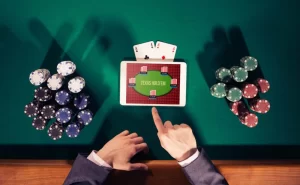
Poker is an absorbing, multifaceted game which demands commitment and practice over time, yet can make a real difference when studied properly. Even great players continually update their strategies as part of a journey towards perfection.
Recognize distractions that interfere with concentration and devise ways to remove them. Try practicing meditation techniques or creating an atmosphere free from unnecessary interruptions.
Game theory
Understanding game theory is crucial to becoming a better poker player, providing a mathematical approach to strategic decision-making in games with multiple interdependent players and helping you balance strategies to maximize gains while minimizing losses.
Though many poker players rely on intuition and guesswork when making decisions at the table, top poker players utilize game theory to make smarter and more informed choices at every turn – this method provides them with an edge against less skilled opponents and boosts results significantly.
Game theory is founded on the premise that one player’s actions can be understood through their expected responses from others, leading to strategies which are both balanced and unexploitable. Furthermore, this form of evaluation provides an objective means of measuring your opponents’ skills.
Betting intervals
Poker is a game of skill, not luck, and any player can improve their abilities through practice and learning from top players. Mastering all aspects of the game will allow you to win more often and increase long-term profits.
Gaining experience at poker requires practice and the best way to gain this is by participating in low-stakes real money games with real money stakes. But you also must learn about its rules and strategies – this can be done online or with video tutorials; professional coaching might also be an option, although this may prove costly.
One of the keys to winning in poker lies in learning to read your opponents’ behavior – this skill alone separates winners from losers.
Bluffing
Bluffing is an integral component of poker strategy, yet can be challenging to master. Newcomers to bluffing may overdo it and attempt it in suboptimal spots; this makes their attempts more easily detectable and reduces winning odds.
To hone your bluffing abilities, it is recommended to practice in low-stakes games with low stakes stakes. By engaging in such practice sessions, you will develop a better sense of how opponents respond to your bets and behaviors as well as observe any body language clues from them that could reveal information on their hand strength.
Journaling can also be an invaluable aid, helping you keep track of your progress and identify areas for improvement. Furthermore, keeping a journal will keep your motivated to make progress towards improving your game and track any mistakes to help prevent repetition in future.
Limits in pot-limit tournaments
Gaining expertise at poker takes hard work, patience, and perseverance. In addition to careful game selection and an ability to focus on tasks at hand, eliminating distractions is key – this can be accomplished by creating an uncluttered environment or practicing meditation techniques – taking breaks is also crucial as long as they don’t interfere with concentration levels.
Some players enjoy limit games due to less math being done and an ability to focus more on pot odds and player reading without needing to consider raise amounts ranging from 5-20 times the original bet amount. Switching over to pot limit preflop would place greater emphasis on post-flop skill and could give skilled opponents too much of an edge against less skilled ones.
Limits in cash games
Limits in cash games are a fundamental aspect of the game, and mastering them will enhance your overall results. One key skill involved with limit poker is analyzing the strength and potential of each hand you hold to extract value from weaker ones and make more profitable decisions.
Bankroll management is another essential aspect of cash game strategies. Being aware of your bankroll size and understanding its limits will allow you to choose which games and when to play them.
Final Step: Take Regular Breaks Between Hands This will allow you to maintain focus and avoid losing concentration. Furthermore, eliminating distractions should also be prioritized, either through creating a distraction-free environment or practicing meditation techniques.







